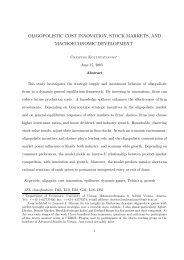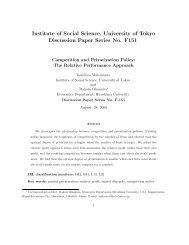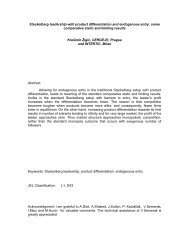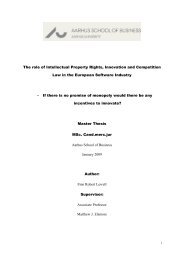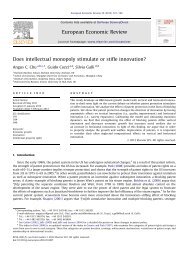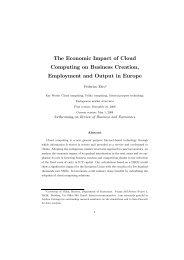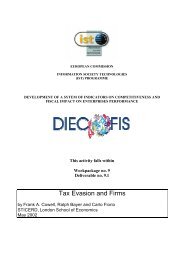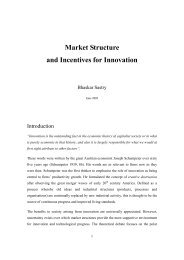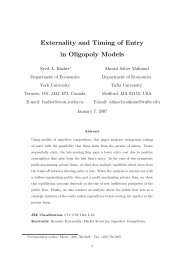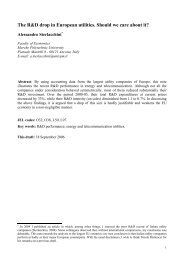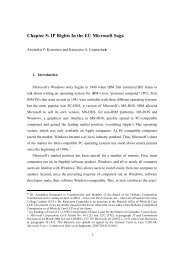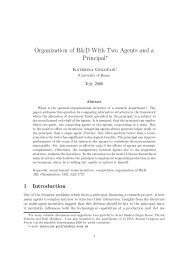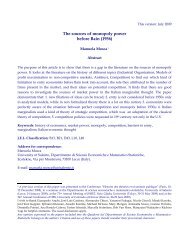The EU Approach to Abuse of Dominance - Intertic
The EU Approach to Abuse of Dominance - Intertic
The EU Approach to Abuse of Dominance - Intertic
You also want an ePaper? Increase the reach of your titles
YUMPU automatically turns print PDFs into web optimized ePapers that Google loves.
avoid that they purchase from foreign suppliers). <strong>The</strong> Commission will apply the rules developed in<br />
relation <strong>to</strong> preda<strong>to</strong>ry pricing <strong>to</strong> such unconditional rebates. We understands that this type <strong>of</strong> rebates is<br />
generally unproblematic except if the dominant company targets some important cus<strong>to</strong>mers. As<br />
mentioned above, the ‘importance’ <strong>of</strong> cus<strong>to</strong>mers is a dangerous and subjective concept, which should<br />
be clarified and subject <strong>to</strong> a strict interpretation. Otherwise, it will give competi<strong>to</strong>rs significant flexibility<br />
<strong>to</strong> argue that unconditional rebates are abusive by targeting an ‘important’ cus<strong>to</strong>mer.<br />
Rebates may provide an economic inducement for a buyer <strong>to</strong> purchase all or a significant part <strong>of</strong><br />
its requirements from the dominant supplier. Single branding obligations, in contrast, are obligations<br />
which require the buyer on a particular market <strong>to</strong> concentrate its purchases “<strong>to</strong> a large extent” with one<br />
supplier by obliging the buyer <strong>to</strong> purchase all or “a significant part <strong>of</strong> its requirements” from the<br />
dominant supplier. <strong>The</strong> higher the percentage <strong>of</strong> their <strong>to</strong>tal requirements buyers must purchase from the<br />
dominant supplier, the stronger will be the foreclosure potential <strong>of</strong> the single branding obligation. If a<br />
single branding obligation is applied <strong>to</strong> a “good part <strong>of</strong> its buyers”, and the obligation therefore affects, if<br />
not most, at least a “substantial part <strong>of</strong> market demand”, the Commission is likely <strong>to</strong> conclude that the<br />
obligation will have a “market dis<strong>to</strong>rting foreclosure effect”. <strong>The</strong> Discussion Paper states that single<br />
branding obligations may have such effects even if only a “modest part <strong>of</strong> market demand” is affected by<br />
the obligation.<br />
In general, the short duration <strong>of</strong> a contract containing a single branding obligation, or a right <strong>to</strong><br />
terminate such a contract on short notice, may not limit the foreclosure effects. If, for a significant<br />
percentage <strong>of</strong> buyers, there are no proper substitutes <strong>to</strong> the dominant supplier’s products, buyers will not<br />
be able <strong>to</strong> forego purchasing from the dominant supplier. A short duration, or the right <strong>to</strong> terminate on<br />
short notice, may thus be illusory since buyers will, in practice, renew the contract with the dominant<br />
supplier, or opt not <strong>to</strong> terminate the supply arrangement. In such circumstances, in order avoid<br />
foreclosure effects, the dominant supplier will have <strong>to</strong> permit buyers <strong>to</strong> purchase from alternative<br />
suppliers, whilst at the same time allowing them <strong>to</strong> continue purchasing from the dominant supplier.<br />
However, a short duration, or the right <strong>to</strong> terminate on short notice, may limit foreclosure effects in<br />
markets where products are homogeneous and competi<strong>to</strong>rs are not capacity constrained. If the dominant<br />
company only applies the single branding obligation <strong>to</strong> a limited number <strong>of</strong> its buyers, the Commission<br />
will investigate whether or not these buyers are <strong>of</strong> particular importance for the entry or expansion <strong>of</strong><br />
competi<strong>to</strong>rs.<br />
<strong>The</strong> dominant firms can justify the use <strong>of</strong> rebates or single branding obligations using an<br />
efficiency defence. A rebate system or a single branding obligation could, for example, be indispensable<br />
<strong>to</strong> obtain cost savings, which thereafter can be passed on <strong>to</strong> consumers as lower prices. <strong>The</strong>y could also<br />
be indispensable <strong>to</strong> provide an incentive for the dominant supplier <strong>to</strong> make relationship-specific<br />
investments in the buyer’s business (e.g. the supplier may pay for equipment, training …). Although we<br />
15



